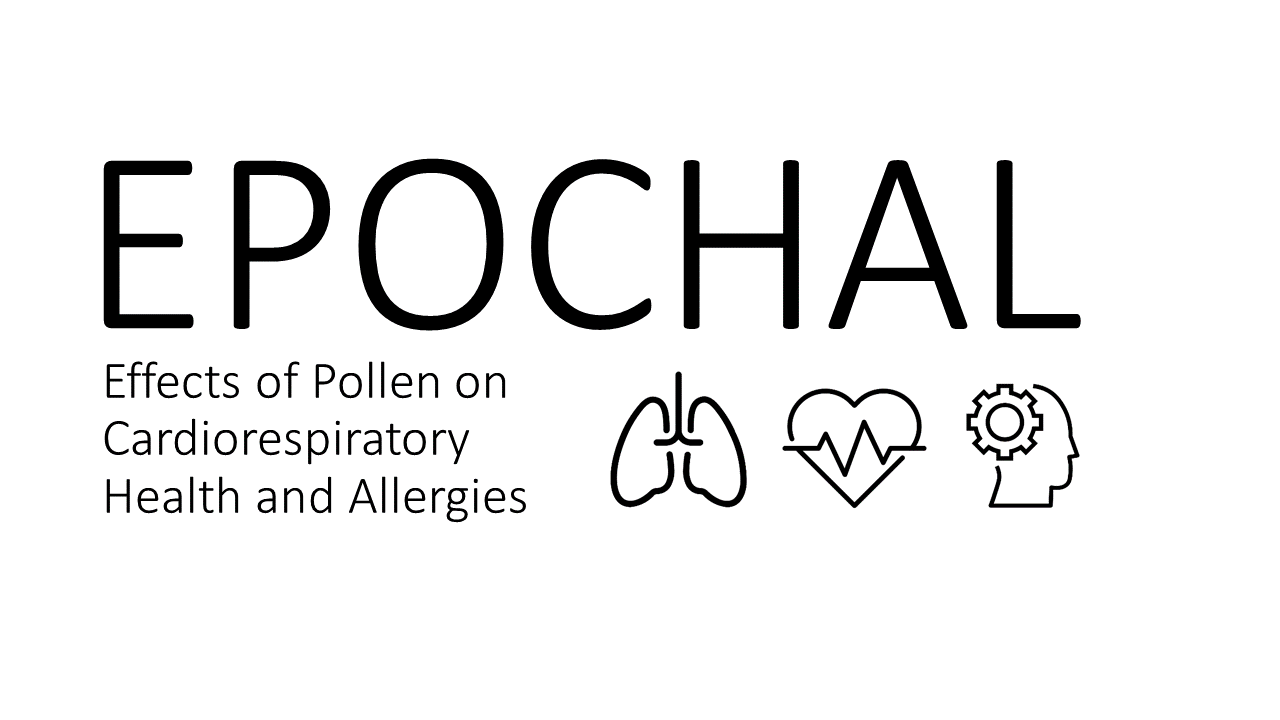EPOCHAL - Beyond seasonal suffering: Effects of Pollen on Cardiorespiratory Health and Allergies
Project Abstract
As climate change increases the duration and intensity of the pollen season, allergies to airborne pollen are increasingly common in Europe. Yet, it is not well recognized that high pollen concentrations may increase respiratory and cardiovascular events, leading to mortality and excess hospitalizations. We aim to investigate how short-term exposure to pollen is related to mortality, hospitalization and allergic symptoms, both on its own and synergistically with air pollution and weather.
EPOCHAL will develop spatiotemporal exposure models of pollen for the years 2003-2022 based on a network of 14 pollen measurements stations in Switzerland. Taking advantage of large, real-world datasets without selection bias (Swiss National Cohort) and the efficient case-crossover study design. We will investigate the population effects of pollen on daily respiratory and cardiovascular mortality and hospitalization, also accounting for variation in air pollution and weather conditions. To explore individual sensitivity, we will conduct repeated measurements of lung function and airway inflammation in a dedicated panel of 400 allergic patients complemented with opportunistic repeated accounts of self-reported symptoms from the “e-symptoms” app by Swiss Allergy Centre. We will derive concentration-response relationships based on prevalent pollen, air pollution and weather triggers and individual symptom reports.
This highly innovative project utilizes available nationwide health datasets and systematic novel data collection methods, to better understand the role of pollen in respiratory and cardiovascular diseases at both personalized and population levels. The project will prevent and reduce health effects due to pollen, which constitute a large burden on health and economy.
TV feature on EPOCHAL: SRF PULS: Aggressive Pollen – Allergien auf dem Vormarsch (20.03.2023)
Main Applicant(s)
Related Publications
All PublicationsGlick S, Gehrig R, Eeftens M. Multi-decade changes in pollen season onset, duration, and intensity: a concern for public health?. Sci Total Environ. 2021;781:146382. DOI: 10.1016/j.scitotenv.2021.146382
Bürgler A, Glick S, Hartmann K, Eeftens M. Rationale and design of a panel study investigating six health effects of airborne pollen: the EPOCHAL study. Front Public Health. 2021;9:689248. DOI: 10.3389/fpubh.2021.689248
Gisler A, Eeftens M, de Hoogh K, Vienneau D, Salem Y, Yammine S, Jakob J, Gorlanova O, Decrue F, Gehrig R, Frey U, Latzin P, Fuchs O, Usemann J, BILD Study Group. Pollen exposure is associated with risk of respiratory symptoms during the first year of life. Allergy. 2022;77(12):3606-3616. DOI: 10.1111/all.15284
Valipour Shokouhi B, de Hoogh K, Gehrig R, Eeftens M. Estimation of historical daily airborne pollen concentrations across Switzerland using a spatio temporal random forest model. Sci Total Environ. 2024;906:167286. DOI: 10.1016/j.scitotenv.2023.167286
Eeftens M, Tummon F, Clot B, Crouzy B, Gehrig R, Vicedo A. Pollenallergie: Auswirkungen eines sich wandelnden Klimas. Swiss Academies Factsheets. 2024;19(1). DOI: 10.5281/zenodo.11124574
Eeftens M, Tummon F, Clot B, Crouzy B, Gehrig R, Vicedo A. Pollen allergy and the impact of a changing climate. Swiss Academies Factsheets. 2024;19(1). DOI: 10.5281/zenodo.11124588
Luyten A, Bürgler A, Glick S, Kwiatkowski M, Gehrig R, Beigi M, Hartmann K, Eeftens M. Ambient pollen exposure and pollen allergy symptom severity in the EPOCHAL study. Allergy. 2024;79(7):1908-1920. DOI: 10.1111/all.16130
Bürgler A, Luyten A, Glick S, Kwiatkowski M, Gehrig R, Beigi M, Hartmann K, Eeftens M. Association between short-term pollen exposure and blood pressure in adults: a repeated-measures study. Environ Res. 2024;256:119224. DOI: 10.1016/j.envres.2024.119224
Valipour Shokouhi B, de Hoogh K, Gehrig R, Eeftens M. Spatiotemporal modelling of airborne birch and grass pollen concentration across Switzerland: a comparison of statistical, machine learning and ensemble methods. Environ Res. 2024;263(Pt 1):119999. DOI: 10.1016/j.envres.2024.119999
Corpening B, Bürgler A, Tamási B, Gehrig R, Gan K, Alonso Hellweg A, Luyten A, Glick S, Beigi M, Hartmann K, Eeftens M. Associations between ambient pollen exposure and measures of cognitive performance. Environ Epidemiol. 2025;9(2):e374. DOI: 10.1097/ee9.0000000000000374
Bürgler A, Glick S, Luyten A, Shi S, Eeftens M. Associations between airborne pollen, pollen-related allergic rhinitis and blood pressure: a systematic review and meta-analysis. Environ Int. 2025;200:109517. DOI: 10.1016/j.envint.2025.109517
Related Topics
All TopicsRelated Activities
All Activities
